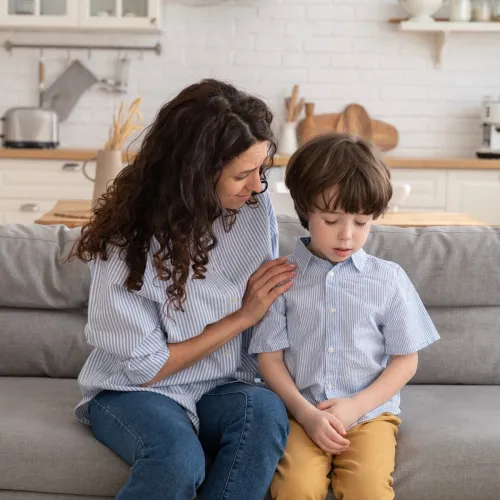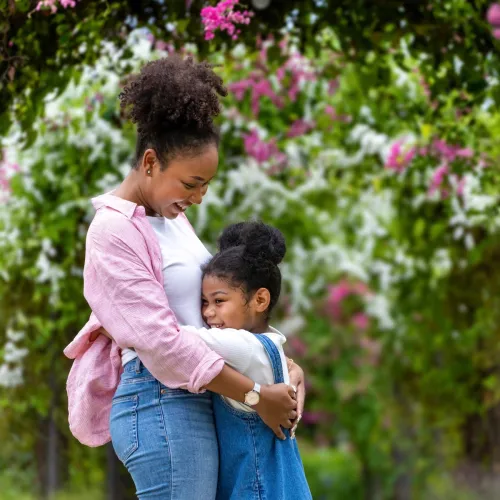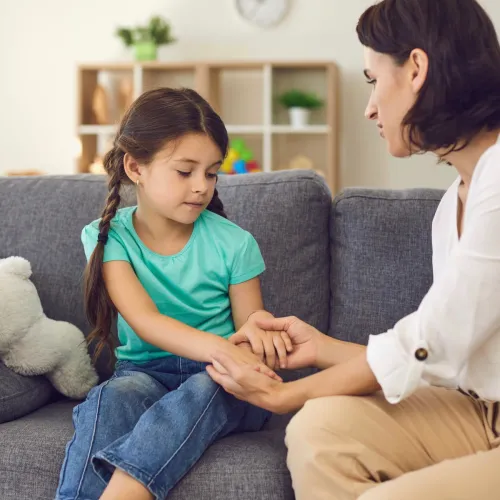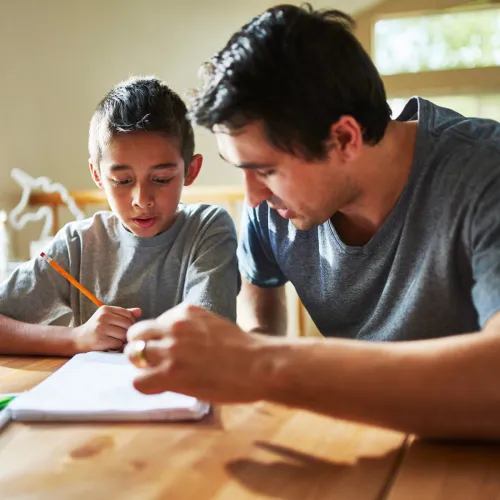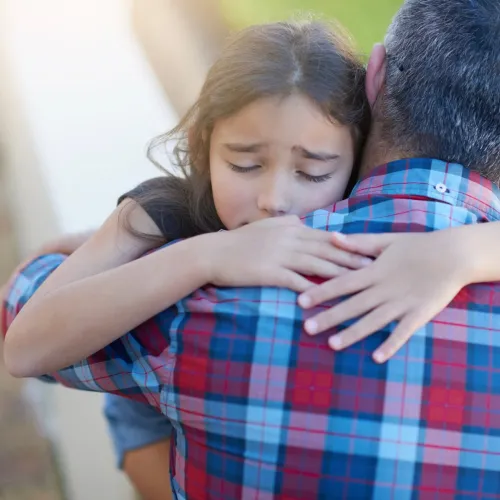Parentification: What It Looks Like and What You Can Do About It
When a parent treats their child as if they were another parent, or an adult, the child often takes on roles and responsibilities that are way above their age. When a child is parentified, they are blocked from experiencing a normal childhood.
This can harm your child, whether it’s coming from you or your co-parent. But if you know the signs and the healthiest responses, then you can recognize it and support your child.
(Some experts believe the term “parentification” is misleading and unhelpful. We’ll use it for clarity, but we’ll explain more in the next section.)
What is parentification?
Parentification happens when a child is treated like they should share the parent’s responsibilities and emotions. The child might have to juggle adult-level duties, or hear adults-only information, or feel responsible for emotionally supporting their parent. Basically, the parent treats the child as an equal. It is “all about the erosion of boundaries between a parent and a child,” says Dené Carroll, a licensed clinical social worker. “It’s usually based on that parent's own trauma.”
“You're essentially asking the child to take on adult worries and problems and information,” says Maria Curran, a licensed clinical mental health counselor. “So oftentimes kids feel like they have to try to fix it, and they can't. It's not even their problem, much less do they have the skill or ability to do so.”
Here’s what parentification can look like, in practical terms.
Leaning on your child for emotional support
Divorce is a stressful, sometimes gut-wrenching experience. But if a parent reveals the depths of their emotions, or even turns to their child for comfort, it can be painful and confusing for the child.
Maria says, “I think sometimes parents will hear, ‘Oh, I have to pretend like everything is 100% fine,’ and it's not that black and white. It's okay that your child knows, ‘Hey, I'm having a tough day. This separation is hard for all of us, right?’ That’s just being real. What isn't okay is to be crying and sobbing and talking to your child about how devastated you are that their other parent is abandoning the family.”
That puts the child in a difficult position, Maria explains. “This child is thinking, ‘I've got to comfort them. I've got to make this okay.’ One, they can't. And two, it's not their job.”

Oversharing, or sharing adult information with your child
In some cases of parentification, explains Maria, “All this adult information is shared with them. Financial disputes with the other parent. Legal concerns. Some of them have read court documents.”
This is a heavy load for a child to bear—and it’s confusing. “Inevitably, because they are kids, and they don't have the life experience and context to put to such adult information, they often end up making judgments that are erroneous or unfair, based on incomplete information.”
Considering your child a best friend
Maria says, “When I'm doing an intake with a parent and a parent tells me that their child is their best friend, that's a big red flag.” Although it’s wonderful for a parent to have a close relationship with their child, treating them as an equal is dangerous.
“Children are not there to make them feel better about things, and they shouldn't be choosing sides.”
Assuming your child feels the same way
“Somebody can be a not-very-good partner and be a great parent, and sometimes adults forget that,” Maria says. “And these parents take their not-very-good experience with their former partner, and they project it out into: ‘I know just how my child feels, because that's how I felt.’
“But you can't just assume that your child feels the same way as you do. That's a mistake. And really,” adds Maria, “if that is happening, it might be because you're oversharing with them about how you feel.”
Relying on your child for too much childcare
When a parent views their older child as another parent, it’s natural to assign a lot of childcare. “And it's really problematic,” says Maria, “because that child tends to be extremely protective of the younger siblings—and inappropriately so. They want to step in and not just give directions, but speak for the other children. And you know, that's a lot of responsibility to put on a child.
“It can also create resentment between siblings,” Maria warns.
Other types of parentification
A study on parentification, published in an international scientific journal, lists the many ways parentification can affect the child. “Common roles children assume include household earner, self-carer, family-navigator, language and cultural broker, self-educator, counselor, confidant, caregiver, and emotional supporter (for parents and siblings).”
What’s wrong with the term “parentification”?
Dené explains, “I don't like the term ‘parentification’ because it pathologizes the children for what really is a dysfunction in the caregiver.”
Pathologizing means labeling a symptom or behavior as something abnormal or unhealthy. But parentified behaviors are a response to a caregiver’s actions (or lack of action). It’s a way a child can adapt to a difficult situation. So the child’s behavior should not be the target of any intervention, criticism, or shame.
“And even that label—‘dysfunction in the caregiver’—I don't love,” adds Dené, “because it's usually rooted in substance use, abuse, trauma, or something severe going on in the life of the caregiver that makes it difficult for them to function properly in their role.”
Parentification is a serious dynamic that can act as a barrier between the child and healthy, developmentally appropriate childhood experiences. For that reason, it’s important to clarify situations that don’t count as parentification, to avoid putting a serious label on a typical family dynamic.
Parentification is not . . .
The most commonly known aspect of parentification is when a kid helps out with too many extra chores and responsibilities. But does that mean helping out is automatically unhealthy? According to our experts, that’s not the case.
These situations don’t count as parentification:
Helping out when the circumstances call for it
Dené explains, “It’s very normal for an older sibling to help out in the morning to get their little siblings off to school. That's not being parentified—kids across the ages have taken on some adult responsibilities to help out when a parent is sick or in a busy morning.”
Not only is it reasonable, but also it can be a sign of emotional health, says Dr. Rebecca Bailey, PhD, founder of Transitioning Families and the Polyvagal Equine Institute. Helping others is simply a part of being a good human. “If we sanitize empathy and caring out of our children, yuck! My kids are all grown up, but if I was sick, I wanted them to know that I needed a little help, or that my son's little sister might need a little help that night. I'm proud to say that I did some things wrong and right as a parent, but one thing they did learn is to pull the oar when Mom or Dad couldn't.”
Sometimes it’s just a practical necessity, Dr. Bailey adds. “Sometimes the kids have to help the kids get up and get to school because Mom has to work.”
Living in a big family
“If there's a lot of kids in the house,” Dené explains, “that's not being parentified. That's just being helpful with the younger siblings. It's the same thing in multi-generational families. We have a lot of judgment around being interconnected as people.”
We asked Dené, how can you tell the difference? Where do you draw the line between healthy helping and parentification? “There is a line between being an interconnected and supportive family member, even as a child, and a dynamic where a child is chronically placed in the position of a caregiver, forced to make decisions, or blocked from developmentally appropriate activities. It becomes concerning when this dynamic causes a level of stress, fear, and overall responsibility where the child is no longer able to engage productively in school, with peers, or in the community.”
An international scientific journal says the biggest difference is whether the caregiving is supervised or monitored. If the parent is still involved, just one step removed, it’s a different situation than if the child caregiver is often fully responsible for their siblings.
How do you know if your child is being parentified?
It depends on a lot of factors, but it’s hard to make a firm judgment. “We have to be careful with any absolutes,” cautions Dr. Bailey. The difference is the ultimate effects on the child. If the child is functioning well, mentally healthy, and generally happy, then it is probably not a parentification situation. If the child is struggling or suffering, then something may be wrong.
If you’re worried about your child, look for these signs of parentification:
Symptoms of mental illness
To know whether your child is struggling, Dené suggests, “I would be looking at the mental health of the kid. Are they depressed? Do they engage with their peers? Do they function in an age-appropriate way? Are they cutting? Are they so anxious they can't leave a parent?”
It’s not always a simple conclusion, though. “Even with significant mental health symptoms,” warns Dené, “you need to be very careful about connecting the dots and assuming the symptoms are related to ‘parentification.’ It is a complex problem that varies from family to family—and kid to kid, for that matter—and would likely need outside support and assessment from a mental health professional.”
If your child displays these signs, seek mental health care.
Your child takes on a mediator role
“In a co-parenting context,” says Dené, “parentification could very often look like a child trying to mediate conflict between the parents.” If the child feels closer to the parentifying parent—because they empathize with their emotions—then the child may feel a compulsion to step in and protect that parent.
Your child tries to investigate or makes assumptions
“When you overshare, kids will inevitably try to figure it out,” warns Maria. “Especially younger kids, who are very black-and-white thinkers. You know, there's right, and there's wrong.”
Maria adds, “Kids also have a tendency to fill in the gaps. If they hear part of something, and they don't know the rest, they make assumptions. Sometimes kids will even start snooping because they want to understand, and sometimes they think that they can help.”
Changing dynamics with the other parent
Maria explains two ways parentification can affect the child’s relationship with the other parent.
“In the first scenario, one parent's giving them the information. And it's going to be skewed in a negative way against the other parent. And so they align with the parent who's giving them this information because they see them as a victim of the other parent, and so they start to resist that other relationship.
“Then you've got this hugely dysfunctional family unit and a kid who's not following a parenting-time schedule. And oftentimes it ends up in court, and so you're back in litigation.
“In the second scenario, if both parents are doing that, then the child feels caught in the middle and unsure of who's ‘telling the truth.’ Oftentimes there's accuracy in parts of each parent's perspective, but it's often taken out of context for the child. So the child will feel like they need to choose who's right and who's wrong, which is very confusing.”
What to do if you’re parentifying your child
There are two schools of thought here. The first is that any parent could fall into a pattern of parentifying, if they’re struggling in a difficult situation and don’t have enough social support. If you feel that’s happening to you, the recommendations listed below could help you break the pattern.
Dené offers a second perspective. “The parent that is thinking to themself, ‘Hmm! I think I'm parentifying my child,’ is probably not a parent who is parentifying their child. A parent who’s parentifying their child may be under significant stress/distress or struggling greatly with their own mental health. In these scenarios, there often is not much insight or awareness, or, if there is, it's buried in shame or overwhelm.”
If that rings true for you, the best thing you can do for your child is get mental health support for yourself. If you have health insurance, you may want to start there. If you don’t have mental health coverage, you could start by finding your local chapter of NAMI, the National Alliance on Mental Illness. Many of their resources are free, and they can help direct you towards the support you need. Or go to SAMHSA, the Substance Abuse and Mental Health Services Administration.
Get a therapist
If you’re struggling with healthy boundaries, a therapist can help you learn how to develop them. This is probably the most helpful thing you can do for your child.
Turn to your support system and/or join a support group
Maria says, “I think that if you're finding yourself leaning heavily on your child because you're having trouble functioning again, that's the time to reassess your support system.”
Getting more social support—however that looks for you—is crucial to changing the direction of your relationship with your child. As Maria adds, “You need other adults you can talk to about what you're going through.”
See your doctor, if needed
“Some people really struggle with depression, going through separation and divorce,” says Maria. “They're grieving. There's no shame in going to your doctor and saying, ‘I'm really having a hard time functioning.’
“I think the focus has to be on, ‘How do I help my child stay healthy and help them manage?’ And if I'm not taking care of me, that's probably not going to happen.”
Apologize when you go too far
Maria says, “People are human, they screw up sometimes, right? In a moment of frustration, they may blurt something out that isn't appropriate. If the parent is healthy enough to recognize, ‘I shouldn't have said that,’ then you can go back to your child and say, ‘I am really sorry I said that about your other parent. I was just frustrated, but it was inappropriate, and I hope that you'll forgive me for saying that.’”
Reprioritize your responsibilities to limit stress
Reversing parentification “may mean reassessing your priorities,” says Maria. “Maybe say, ‘We’ll eat simple dinners that take only 20 to 30 minutes to prep and put out on the table.’ Or how important is it that you vacuum daily? Not that I've ever done that! But I'm just throwing it out there: Sometimes I think people try to maintain a lifestyle that's not practical when you're a single parent.”
What to do if your co-parent might be parentifying your child
Dené warns that this is a tricky, even dangerous question. “It's not really helpful to think, ‘My child's being parentified by the other parent. What can I do?’ What you can do is stay focused on yourself, stay focused on your home, and do whatever it takes to work through the co-parenting conflict.”
Dr. Bailey suggests you ask the question this way: “Okay. Maybe this is true. But what can I do in this house to support the resiliency of this child?”
Don’t blame your co-parent, throw them under the bus, or escalate conflict
Maria says it’s fine to vent to another adult. But “Parent B has got to be careful about not saying, ‘Oh, poor thing! That's so unfair! I don't know why Parent A does that to you.’ That's not really helpful to the child. And, of course, it's going to breed resentment against Parent A. It's just not functional in terms of teaching your child to problem-solve.”
That doesn’t mean you have to ignore the situation. “To your child, you can say things like, ‘Wow, that sounds really frustrating. I'm wondering, have you told mom or dad that you're feeling stressed about having to help get your sister ready for bed, or ready for school, or watching the baby?’”
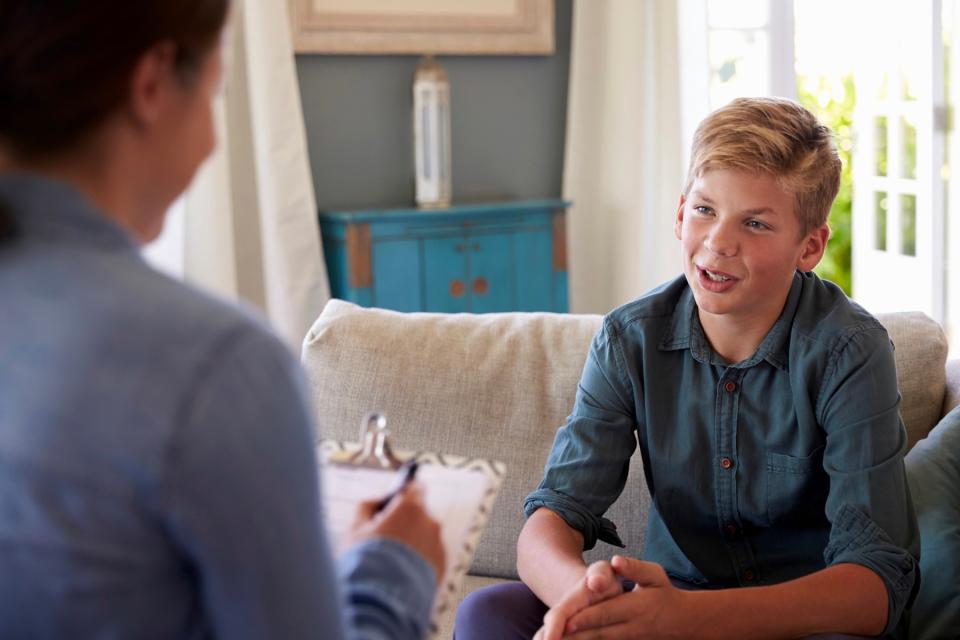
Get your child into therapy
A therapist can teach a child how to set up their own healthy boundaries. Maria explains, “When I'm the child’s therapist, I really try to work with the child on understanding, ‘You know your parents’ relationship is theirs. It is not yours.
“‘And it is okay to say to either of your parents, “That sounds like adult information, and I really don't want to hear it.” Or, “I feel uncomfortable when you talk about the other parent. Can we please change the subject?”’ In some cases, if that doesn't work, I'll tell them, ‘Start with, “Maria said I'm not supposed to hear adult information.”’”
Support your child’s mental health at home
Children need to learn healthy boundaries, and there are two ways to help them do that. First, talk through situations that require boundaries. Teach them to listen to their own feelings, and help them make a plan for verbalizing their boundaries in difficult situations, even when it feels scary or embarrassing.
Second, model healthy boundaries. Let them see you sticking to your boundaries, and vocalize what’s happening (when appropriate). Kids learn from observing.
Help your child develop resilience, too, so that they can bounce back from difficult situations like parentification.
Ask open-ended questions
“A lot of parents just accept what the child is saying,” says Maria. “They don't ask open-ended questions to get more information. And so they just hear this thing, put it in their own context, and charge ahead.
“For instance, one child told me, ‘I have to do all the laundry.’ I said, ‘Really! What does that look like?’ And I would coach Parent B to say to Parent A, ‘Hey. Our kid told me she's doing all the laundry. Which doesn't seem like it makes sense. What can you tell me about this?’ And so it's a question.”
Work with a parenting coordinator
Reach out to your parenting coordinator, suggests Maria, and say, “Hey, can you help us have a discussion? I'm concerned that Parent A may be parentifying our child. I don't want to jump to conclusions, but we don't communicate so well.”
Don’t shame your child or label the situation
Even if you’re confident your child is being parentified, you don’t need to tell them. Support them in other ways and help them gain the tools they need to draw healthy boundaries.
Dené says, “Kids can actually experience a lot of shame when you directly try to intervene when they're acting out in a parentified way. Some kids might be really proud of how they're helping. They're just doing what they need to do to survive.”
Find more resources
These resources might be helpful if you’re dealing with a suspected parentification situation:
- Teaching Kids About Boundaries from the Child Mind Institute
- How to Find a Therapist from Psychology Today
- Resilience guide for parents and teachers from the American Psychological Association
- Family Resources from the AFCC (the Association of Family and Conciliation Courts)
Broaden your child’s social connections
“Get them out of both of the houses,” says Dené. “Get them doing something totally different, out of the whole [high-conflict] pressure cooker.” Try extracurriculars, religious organizations, playdates at the park, community groups, clubs, and other types of social connection.
Long-term risks of being parentified
Maria explains, “Kids who grow up with family conflict are at risk for all kinds of interpersonal issues, relationship issues, substance abuse, and difficulty functioning as a healthy adult in society.” The scientific journal reports that parentified children have a “higher incidence of depression, anxiety, drug use and addiction, under- and un-employment, poor physical health, and lower educational attainment.”
“Parentification puts a lot of stress and responsibility on the child,” Maria says, “and often they’re not equipped to deal with it.”
Can parentification be cured or prevented?
Dr. Bailey asks: “We as a culture and society, what do we do when a child is overburdened? Even without a mentally ill parent, it's an overwhelming world we live in, right? We're all under extreme pressure. When we see parentification, the question should be, ‘What kind of social supports are needed?’”
Dené recommends the Strengthening Families model, which lists five things that have the biggest impact on a family’s health and stability. Social support is #2. The model shows that when a child or parent has friends, family, and neighbors who provide emotional or practical support, that can help them feel connected and appreciated. That can minimize both the source of parentification (not having enough support) and the results (a child taking on too much).
“Social support might fix it,” says Dr. Bailey. “Providing a mentor might fix it. Helping the kid get a ride to wherever he needs to go could help. We, as human beings, are dependent on our ability to socially connect with others.”
“It’s a hard dynamic,” says Dené, “but we have to help support families and parents to be as mentally well as they can be, so that kids can thrive.”
Parentification is a difficult situation, but there are ways to help your child
If you’re worried that your child is dealing with parentification (from either parent), it can be very stressful. Parentification does have painful and damaging effects, both short-term and long-term—but it doesn’t have to be permanent, and it’s not unfixable.
Take your child to therapy, model and discuss healthy boundaries, and look for ways to increase your child’s social support. With you in their corner, your child can develop resiliency, boundaries, and a healthy social and emotional life.

